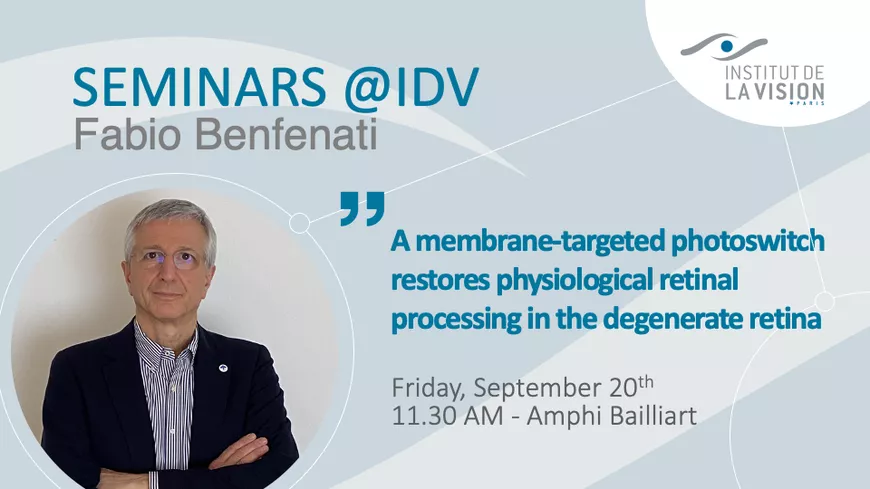A membrane-targeted photoswitch restores physiological retinal processing in the degenerate retina
Invited by Serge Picaud, Fabio Benfenati, PhD (Italian Institute of Technology, University of Genoa, Italy), will speak on Friday September 20 at 11:30 am. Meet in the Lusseyran meeting room.

Abstract
The lack of effective therapies for visual restoration in Retinitis pigmentosa and macular degeneration has pushed the scientific community to pioneer therapeutical strategies to replace dead photoreceptors, including optogenetics and retinal prostheses. However, the resulting visual restoration is poor mainly because of the massive light-evoked activation of retinal neurons, irrespective of the physiological segregation of visual information in ON and OFF channels responsible for contrast sensitivity and spatial resolution. Here, we show that a recently characterized membrane-targeted photoswitch, Ziapin2, which intercalates within the neuronal membrane and bidirectionally modulates its capacitance and excitability, is capable of reinstating, in degenerate retinas, the complexity of the physiological responses to light stimuli that are implemented by a healthy retina. We tested the ex vivo effects of Ziapin2 on blind retinal explants from rd10 mice and RCS rats, two distinct genetic models of photoreceptor degeneration, by recording light-evoked responses from retinal ganglion cells (RGCs) with patch-clamp and high-density multielectrode arrays.
Thanks to its dual effect on intrinsic excitability, Ziapin2 reinstated brisk and sluggish ON, OFF, and ON-OFF responses in RGCs evoked by full-field or patterned stimuli, accompanied by the reactivation of excitatory and inhibitory conductances impinging on RGCs. Pharmacological dissection of retinal processing revealed that the light-dependent effects of Ziapin2 occurred at the bipolar cell level, followed by reactivation of light computation in the entire retinal network. When tested in vivo, a single intravitreal injection of Ziapin2 in fully blind 6-month-old rd10 mice restored light-driven behavior and optomotor reflexes, with a concomitant activation of RGC populations similar to sighted animals. The results indicate that Ziapin2 is a promising molecule for reinstating physiological visual responses at late stages of retinal degeneration, irrespective of the mutation causing degenerative blindness.
About Fabio Benfenati
Fabio Benfenati graduated in Medicine and specialized in Neurology at Bologna University. He is full professor of neurophysiology at Genoa University and research director at the Italian Institute of Technology, where he founded the Department of Neuroscience. He worked at Karolinska Institutet and Rockefeller University and extensively collaborated with Nobel laureate Paul Greengard. He studied the physiology of synaptic plasticity and novel hybrid interfaces between neurons and nanomaterials.
